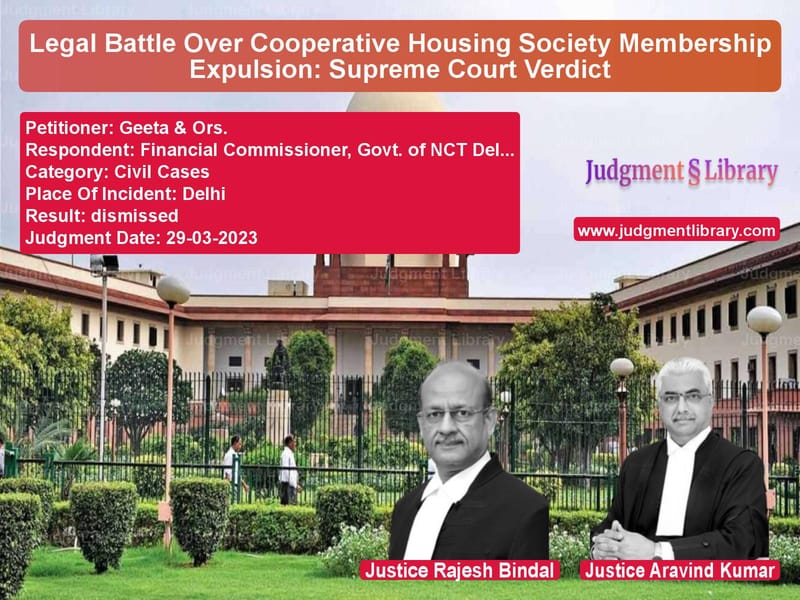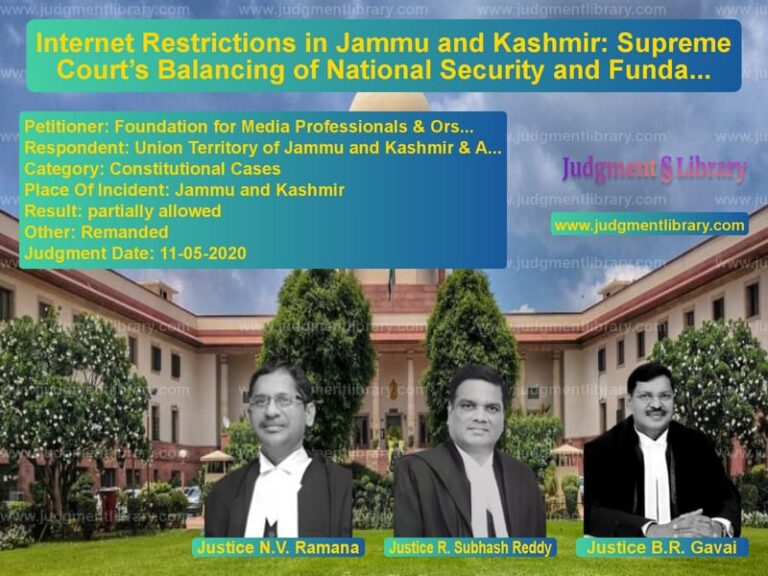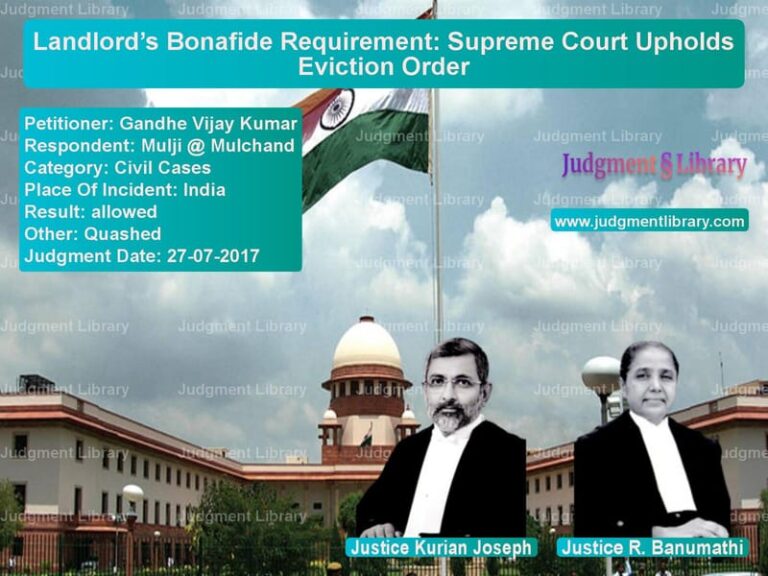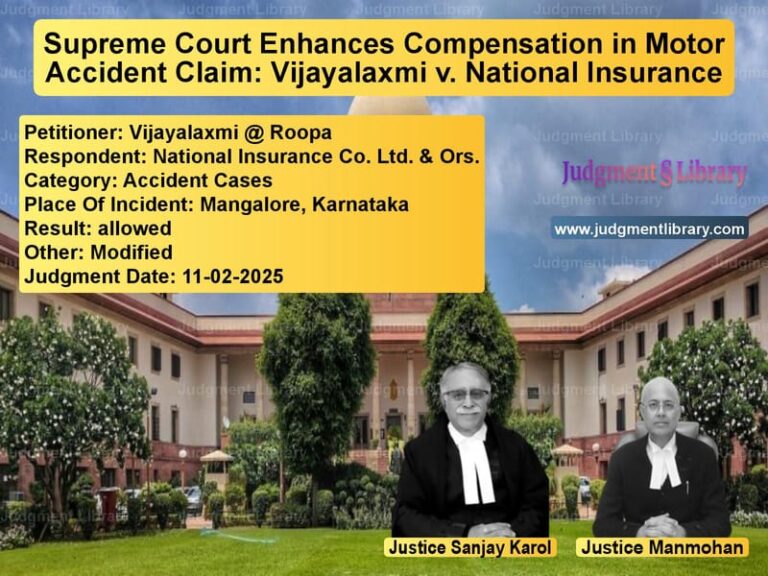Legal Battle Over Cooperative Housing Society Membership Expulsion: Supreme Court Verdict
The Supreme Court recently delivered a crucial judgment in a long-standing dispute concerning the expulsion of a member from the Nav Jagriti Cooperative Group Housing Society Limited. The case, involving financial dues, procedural compliance, and the rights of cooperative society members, has set a precedent for similar cases in the future.
The case was brought before the Supreme Court after the petitioners, Geeta & Ors., exhausted all legal remedies at the lower courts, including the Delhi High Court and the Financial Commissioner, Govt. of NCT Delhi. The core issue revolved around the expulsion of the petitioner’s late husband from the cooperative society due to non-payment of dues and the subsequent reallocation of the flat to another member.
Background of the Case
The late husband of appellant no.1 was a member of the Nav Jagriti Cooperative Group Housing Society. In 1992, the society decided to expel him due to his alleged failure to pay outstanding dues. The case progressed through various judicial forums, where the expulsion was upheld at every stage.
The appellants challenged the expulsion, arguing that the society had acted unfairly, miscalculated dues, and failed to follow proper procedures. However, all judicial forums—including the Financial Commissioner, the Delhi High Court, and finally the Supreme Court—ruled against them.
Key Legal Issues
- Whether the expulsion of the member was legally valid.
- Whether the prescribed procedure under the Delhi Cooperative Societies Act and Rules was followed.
- Whether the member was given fair opportunities to clear outstanding dues.
- Whether the expulsion violated any constitutional rights.
Arguments from the Petitioners
- The petitioners argued that the society had not followed the due process outlined in Rule 36 of the Delhi Cooperative Societies Rules, 1973.
- They contended that the dues of ₹1,72,990/- were wrongly calculated, as the late husband had already paid ₹1,40,500/-.
- The petitioners further claimed that the enhancement of flat costs was unjustified and arbitrary.
- They also asserted that they had not been given sufficient opportunity to rectify the default.
Arguments from the Respondents
- The respondents maintained that the expulsion was carried out after multiple notices and meetings, in full compliance with legal procedures.
- They pointed out that despite repeated reminders, the petitioner failed to clear the dues.
- They stated that the petitioner was given multiple opportunities to pay the dues even after the expulsion was approved.
- The respondents emphasized that a new member had already been inducted in place of the expelled member, making reinstatement impractical.
Supreme Court’s Observations
After analyzing the records and legal submissions, the Supreme Court made the following key observations:
- The cooperative society had acted in accordance with legal provisions and had given the expelled member sufficient time to rectify the default.
- The expulsion was based on a genuine financial default, and procedural compliance was adequately demonstrated.
- The petitioners were using procedural arguments to evade their financial obligations.
- The principle of financial discipline in cooperative societies must be upheld, as non-payment of dues disrupts the cooperative framework.
Final Judgment
The Supreme Court upheld the expulsion and ruled:
“A cooperative society functions on the principles of mutual trust, responsibility, and financial discipline. Members must fulfill their obligations, and procedural objections cannot be used as a shield against financial defaults.”
With this ruling, the expulsion was affirmed, and the petitioners’ appeal was dismissed.
Legal Precedents Established
- Financial Discipline: The ruling reinforces that cooperative society members must adhere to their financial obligations.
- Due Process: The judgment sets a standard for what constitutes fair expulsion procedures.
- Finality of Expulsions: Courts are unlikely to interfere with cooperative society expulsions unless clear procedural violations are demonstrated.
Impact of the Judgment
- Ensuring Compliance: The ruling emphasizes the need for cooperative members to comply with financial rules.
- Strengthening Cooperative Governance: Societies can now take firm action against defaulters without fear of prolonged litigation.
- Legal Precedent: This judgment will influence future cases involving cooperative society disputes.
Conclusion
The Supreme Court’s decision in this case underscores the importance of financial discipline and procedural compliance in cooperative societies. The ruling affirms that while procedural safeguards must be followed, they cannot be used to bypass financial obligations. This judgment serves as a reminder that cooperative societies operate on principles of shared responsibility, and members must honor their commitments.
Petitioner Name: Geeta & Ors..Respondent Name: Financial Commissioner, Govt. of NCT Delhi & Ors..Judgment By: Justice Rajesh Bindal, Justice Aravind Kumar.Place Of Incident: Delhi.Judgment Date: 29-03-2023.
Don’t miss out on the full details! Download the complete judgment in PDF format below and gain valuable insights instantly!
Download Judgment: geeta-&-ors.-vs-financial-commission-supreme-court-of-india-judgment-dated-29-03-2023.pdf
Directly Download Judgment: Directly download this Judgment
See all petitions in Property Disputes
See all petitions in Contract Disputes
See all petitions in Landlord-Tenant Disputes
See all petitions in Specific Performance
See all petitions in Damages and Compensation
See all petitions in Judgment by Rajesh Bindal
See all petitions in Judgment by Aravind Kumar
See all petitions in dismissed
See all petitions in supreme court of India judgments March 2023
See all petitions in 2023 judgments
See all posts in Civil Cases Category
See all allowed petitions in Civil Cases Category
See all Dismissed petitions in Civil Cases Category
See all partially allowed petitions in Civil Cases Category







